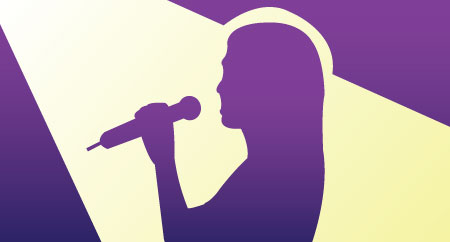Characters
COOKIE Soprano – Talk-show host. She is affable, enthusiastic, sincerely interested in her guests’ problems, and always in control, even when shocked by a revelation or forced to be stern.
STUDIO Soprano – A representative member of the studio audience, she is inclined to be judgmental, impatient, sharp-tongued, not easily fooled.
AUDIENCE Mezzo – Another audience member, she is empathetic and supportive, has probably read many self-help books.
GILDA Coloratura – About twenty, both innocent and ignorant, dressed in 16th century costume, she feels devotion, infatuation, and sorrow with equal intensity. She is from another time.
DUKE Tenor – Dashing, conceited, shallow, he happily pursues pleasure, unaware of the consequences of his actions.
RIGOLETTO Baritone – Hunchbacked, twisted in body and spirit, dressed in standard jester garb, he feels oppressed by society, fate, and his own melancholy. His only power is his anger.
STUDIO and AUDIENCE can be divided among more than two singers. Also, several non-singing performers can play additional members of the studio audience and react verbally ad lib at appropriate moments during the opera.
Piano only or
Chamber orchestration: flute, oboe, clarinet bassoon, trumpet, piano, strings
or
Combo orchestration: clarinet, trumpet, bass, piano
First place, National Opera Association new opera competition
The topic on Cookie’s talk show, “Cookie Time”, is “My father works for my boyfriend,” and her guests are Gilda, the Duke, and Rigoletto. Cookie strives to help the Verdi characters deal with their pain and get a grip, while the Studio Audience (represented by two singers) heckle and cheer by turns.
Length: 42 minutes
(click to launch matching score)
Cookie’s first guest is Gilda, whom she tries to draw out with compliments and empathetic observations. But Cookie (and her studio audience) are a bit taken aback when Gilda opens up.
Performed by the Manhattan School of Music Opera Department
Excerpt – Talk Opera
Characters
COOKIE Soprano – Talk-show host. She is affable, enthusiastic, sincerely interested in her guests’ problems, and always in control, even when shocked by a revelation or forced to be stern.
STUDIO Soprano – A representative member of the studio audience, she is inclined to be judgmental, impatient, sharp-tongued, not easily fooled.
AUDIENCE Mezzo – Another audience member, she is empathetic and supportive, has probably read many self-help books.
GILDA Coloratura – About twenty, both innocent and ignorant, dressed in 16th century costume, she feels devotion, infatuation, and sorrow with equal intensity. She is from another time.
DUKE Tenor – Dashing, conceited, shallow, he happily pursues pleasure, unaware of the consequences of his actions.
RIGOLETTO Baritone – Hunchbacked, twisted in body and spirit, dressed in standard jester garb, he feels oppressed by society, fate, and his own melancholy. His only power is his anger.
STUDIO and AUDIENCE can be divided among more than two singers. Also, several non-singing performers can play additional members of the studio audience and react verbally ad lib at appropriate moments during the opera.
Piano only or
Chamber orchestration: flute, oboe, clarinet bassoon, trumpet, piano, strings
or
Combo orchestration: clarinet, trumpet, bass, piano
First place, National Opera Association new opera competition
The topic on Cookie’s talk show, “Cookie Time”, is “My father works for my boyfriend,” and her guests are Gilda, the Duke, and Rigoletto. Cookie strives to help the Verdi characters deal with their pain and get a grip, while the Studio Audience (represented by two singers) heckle and cheer by turns.
Length: 42 minutes
(click to launch matching score)
Cookie’s first guest is Gilda, whom she tries to draw out with compliments and empathetic observations. But Cookie (and her studio audience) are a bit taken aback when Gilda opens up.
Performed by the Manhattan School of Music Opera Department
Excerpt – Talk Opera


